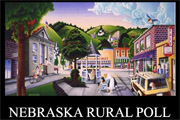Agricultural Economics, Department of

Nebraska Rural Poll
Date of this Version
2022
Document Type
Report
Citation
Nebraska Rural Poll, Research Report (November 2022) 22-2, 41 pages
Institute of Agriculture and Natural Resources, University of Nebraska-Lincoln
Also available at http://ruralpoll.unl.edu/pdf/22naturalresources.pdf
Abstract
Most rural Nebraskans receive their home tap water from city water or municipal water systems. Just over two-thirds of rural Nebraskans receive their drinking water from a municipal system. One-quarter have private well water and seven percent are on a rural water system.
Many rural Nebraskans have tested their home tap water for nitrates. However, a similar proportion indicated they have not tested their water or are unsure. Persons with higher household incomes are more likely than persons with lower incomes to have tested their home water for each of the items listed. Many persons with the lowest household incomes unsure if their water has been tested.
Most rural Nebraskans do not treat their home tap water before drinking it. Persons living in or near the smallest communities (who were more likely to have private well water) are more likely than persons living in or near larger communities to not treat their home tap water.
Rural Nebraskans have mixed opinions about various water problems. At least three in ten are concerned or very concerned about the following: contaminants in their water supply, water quality affecting their or their family’s health, water quality affecting wildlife or environment, water quality affecting the cost of water bills, and water will be too polluted. However, either the same or larger proportions indicate they are not concerned or not very concerned about these same items.
Rural Nebraskans’ concerns about severe weather events have fluctuated over time. Concerns over extreme temperatures and more severe droughts declined between 2015 and 2020 but then increased again this year. The level of concern for these weather events this year is the highest over the three periods. Concerns about more severe droughts declined from 48 percent in 2015 to 21 percent in 2020 before increasing to 55 percent this year. However, when asked about more frequent extreme rains or floods, the level of concern was highest in 2020. Just under three in ten were concerned about extreme rains or floods in 2020, compared to just under one-quarter this year and 15 percent in 2015. In 2020, the flooding of 2019 was fresh in respondents’ minds. In 2015 parts of the state had been in drought the previous year and in 2022 most of the state is experiencing drought. These likely account for the differing levels of concerns between those years.
This year, at least one-half of rural Nebraskans are concerned or very concerned about more severe droughts or dry periods (55%) and more extreme summer temperatures (50%). The Panhandle residents are more likely than residents of other regions to be concerned about more severe droughts or dry periods and more extreme summer temperatures. Rural Nebraskans are less likely to agree that we will learn to live with and adapt to climate change this year as they were in both 2013 and 2008. Just over six in ten agree with the statement this year, compared to just over seven in ten respondents in both 2013 and 2008.
This year, most rural Nebraskans agree that we will learn to live with and adapt to climate change and that we have a responsibility to future generations to reduce the effects of climate change. A slight majority of rural Nebraskans agree that human activity is contributing to climate change. However, many rural Nebraskans agree that too much attention is paid to global climate change. This opinion was particularly apparent among persons with occupations in agriculture.
Many rural Nebraskans favor proposals to reduce the effects of climate change that use tax credits or taxing corporations based on the carbon emissions they produce. Opinions are mixed on tougher carbon emission standards and tougher fuel-efficiency standards. Many rural Nebraskans oppose tax credits for electric vehicles.
Included in
Agribusiness Commons, Agricultural and Resource Economics Commons, Civic and Community Engagement Commons, Community-Based Research Commons, Demography, Population, and Ecology Commons, Entrepreneurial and Small Business Operations Commons, Place and Environment Commons, Public Affairs, Public Policy and Public Administration Commons, Regional Economics Commons, Rural Sociology Commons

